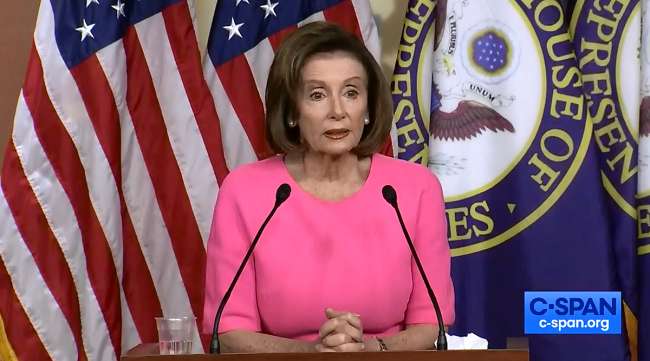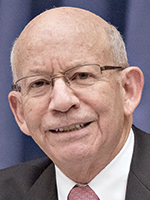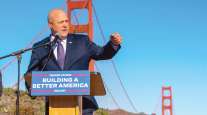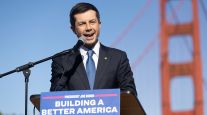Senior Reporter
Pelosi Looks to Infrastructure for Next Coronavirus Crisis Response

[Stay on top of transportation news: Get TTNews in your inbox.]
House Democrats see infrastructure investment as a key element in helping the nation rebound from the cornoavirus pandemic, and are working to advance a multiyear legislative response that will prioritize improvements to freight and commuter mobility, Speaker Nancy Pelosi told reporters April 1.
“We all know our nation faces an historic health and economic emergency as we confront the coronavirus epidemic,” Pelosi (D-Calif.) said. “As we work to address the immediate health emergency, mitigate the economic impact and lay the foundation for a strong recovery, we must take bold action to renew America’s infrastructure. We need to invest in our infrastructure to address some of the critical impacts and vulnerabilities in America that have been laid bare by the coronavirus.”
The centerpiece of the Democrats’ plan is a five-year, $760 billion proposal unveiled earlier this year that would prioritize severe-weather resilience, access to broadband, water-quality initiatives, commercial transportation connectivity, transit and bridge repairs.
Transportation and Infrastructure Chairman Peter DeFazio (D-Ore.) and Energy and Commerce Chairman Frank Pallone (D-N.J.) emphasized their readiness to unveil portions of the package as early as this month. Lawmakers are expected to resume their legislative schedule April 20.
Speaking to reporters, DeFazio linked his policy objectives to concerns he shares with many of his colleagues.
“I believe climate change is — even in times of coronavirus — is an existential threat, and if we’ve got to rebuild our infrastructure, let’s rebuild it in a way that is resilient for severe climate events. Let’s rebuild it with new materials that are less carbon intensive. Let’s rebuild it in a way so we move away from fossil fuel dependence in transportation,” he said.
DeFazio has indicated his panel would reveal legislation this spring that would update a 2015 highway law that expires this fall. However, neither the speaker nor her leadership team presented a funding mechanism that would ensure the long-term solvency of the Highway Trust Fund, an account used to back highway programs nationwide.

DeFazio
The Democrats’ plan aligns with President Donald Trump’s recent suggestion of taking up a $2 trillion infrastructure-centric package that would serve as a tool for stabilizing the economy.
“I proposed a $2 trillion infrastructure plan, which would not only fix our roads and highways and bridges and tunnels and other things, but will also do something very good. It’s called jobs,” Trump told reporters at the White House on April 1. Long-term borrowing at zero percent interest would back the package, the president explained.
Congress recently advanced a $2.2 trillion rescue package tied to the COVID-19 outbreak that has been enacted into law by the president.
Compare each of the presidential candidates' plans for addressing America's infrastructure needs. See our Candidate Infrastructure Tracker.
Congressional Republican leaders have not endorsed an infrastructure funding plan for the next phase of the coronavirus response. However, several industry stakeholders expressed optimism about recent attention devoted to infrastructure policy.
Ed Mortimer, vice president of transportation and infrastructure at the U.S. Chamber of Commerce, told Transport Topics, “We are glad to see renewed commitment from President Trump and Speaker Pelosi on modernizing America’s infrastructure. It is critically important to find a way to pay for the investment that is needed, and we look forward to working with Republicans and Democrats to get a package enacted this year.”
American Trucking Associations President Chris Spear said current market dynamics are ideal for pushing forward with a sustainable source of funding for the country’s surface transportation system. ATA has proposed the Build America Fund, meant to generate $340 billion in about 10 years through the adoption of a 20-cents-per-gallon fee on motor fuels collected at the wholesale rack. Revenue accrued would be phased in over four years at 5 cents annually, according to ATA.

Spear
“We agree with Speaker Pelosi and President Trump on the need to invest in our infrastructure, and we also believe that now is a time to pay for it,” Spear told TT. “Mortgaging the future for younger Americans with billions and trillions of additional borrowing for roads and bridges can be avoided in this unique moment, with fuel prices at historic lows.”
Spear and Zippy Duvall, CEO of the American Farm Bureau Federation, shared their viewpoint with the top tax policymakers on Capitol Hill on April 1.
“The federal fuel tax, which has not been raised since 1993, must be adjusted to compensate for losses in buying power due to inflation and the real revenue reductions as a result of improved fuel efficiency,” they wrote to the chairmen and ranking members of the Senate Finance and House Ways and Means committees. “All Americans will benefit from a surface transportation system that ensures the continued safety and efficiency of our food supply.”
Congress has not increased the 18.4 cents-per-gallon gas tax and 24.4 cents-per-gallon diesel tax since 1993.
The renewed focus on infrastructure policy resembles the enthusiasm Pelosi and Trump expressed nearly a year ago. At that time, the speaker and the president began discussing a long-term infrastructure package before negotiations ended abruptly due to political tensions. Around that time, Republicans who control operations in the Senate moved a five-year highway bill past the committee level, but it never advanced from there.
Want more news? Listen to today's daily briefing:




